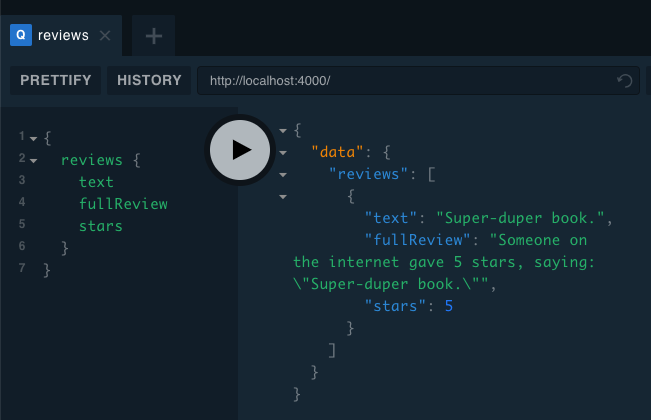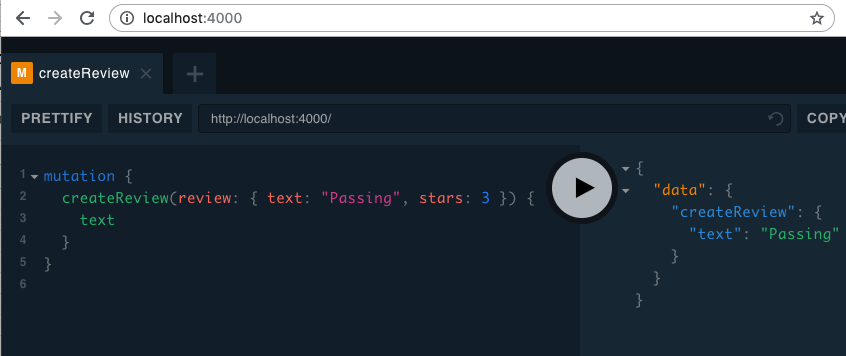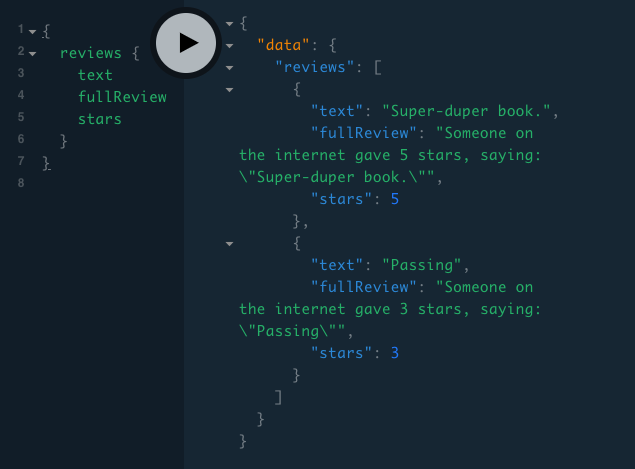Types and resolvers
To view this content, buy the book! 😃🙏
Or if you’ve already purchased.
Types and resolvers
If you’re jumping in here,
git checkout 1_0.2.0(tag 1_0.2.0, or compare 1...2)
The heart of a GraphQL server is the types and resolvers. The schema has the types and each type’s fields, and the resolvers resolve each field. We generally resolve fields by fetching data from a data source, formatting fetched data, or enacting mutations.
Let’s add some more types and fields to get a better sense of how they match up with resolvers. We want people to be able to submit reviews for the book, so we need a mutation:
type Mutation {
createReview(text: String!, stars: Int): Review
}The convention for naming a creation mutation is create<Type>, and it usually resolves to that type (hence : Review at the end). However, it’s best practice to use a single input type as an argument instead of listing out all the scalars needed. So let’s change it to:
type Mutation {
createReview(input: CreateReviewInput!): Review
}
input CreateReviewInput {
text: String!
stars: Int
}We also want people to be able to read past reviews, so we add a Query field:
type Query {
hello: String!
reviews: [Review!]!
}We don’t have a Review type yet, so we need to add that:
type Review {
text: String!
stars: Int
fullReview: String!
}All together, our new schema looks like this:
const server = new ApolloServer({
typeDefs: gql`
type Query {
hello: String!
reviews: [Review!]!
}
type Review {
text: String!
stars: Int
fullReview: String!
}
type Mutation {
createReview(review: CreateReviewInput!): Review
}
input CreateReviewInput {
text: String!
stars: Int
}
`,
resolvers: { ... }
})We need a resolver for each field except for the input type. (Input types are only used for mutation arguments: fields can’t resolve to input types, so input types don’t need resolvers.) The structure of our resolvers object matches the schema, so it should look like:
const server = new ApolloServer({
typeDefs: ...
resolvers: {
Query: {
hello: () =>
reviews: () =>
},
Review: {
text: () =>
stars: () =>
fullReview: () =>
}
Mutation: {
createReview: () =>
},
}
})Now let’s fill them in! We’ll start with createReview:
const reviews = [
{
text: 'Super-duper book.',
stars: 5
}
]
const server = new ApolloServer({
typeDefs: ...
resolvers: {
...
Mutation: {
createReview: (_, { review }) => {
reviews.push(review)
return review
}
}
}
})We don’t need the first resolver parameter, just the second, which contains the mutation argument—the review. We add it to our array of reviews and return it (since our schema says that createReview resolves to an object of type Review).
Next we can implement the reviews Query field:
const reviews = [
{
text: 'Super-duper book.',
stars: 5
}
]
const server = new ApolloServer({
typeDefs: ...
resolvers: {
Query: {
hello: ...
reviews: () => reviews
}
}
})For Query.reviews we just return our array of reviews. But a GraphQL server doesn’t just return the reviews array to the client: it looks at the schema, sees that Query.reviews resolves to [Review!]!, checks to make sure the reviews array is non-null, and then resolves each object in the array as a Review. The way it does that is by calling Review field resolvers, which we also have to define:
const reviews = [
{
text: 'Super-duper book.',
stars: 5
}
]
const server = new ApolloServer({
typeDefs: ...
resolvers: {
Query: {
hello: ...
reviews: () => reviews
},
Review: {
text: review => review.text
stars: review => review.stars
fullReview: review =>
`Someone on the internet gave ${review.stars} stars, saying: "${
review.text
}"`
}
}
})When the GraphQL server calls a Review field resolver, it provides the object as the first parameter, for example:
{
text: 'Super-duper book.',
stars: 5
}The text and stars type fields we can just resolve to the corresponding object properties (for example, text: review => review.text). And we can actually take the text and stars resolvers out, because Apollo Server will do that by default. The fullReview field isn’t a property on the object, so the default resolver won't work. So we define our own resolver, returning a string constructed from the review’s properties.
All together, without the extraneous object property resolvers, we have:
import { ApolloServer, gql } from 'apollo-server'
const reviews = [
{
text: 'Super-duper book.',
stars: 5
}
]
const server = new ApolloServer({
typeDefs: gql`
type Query {
hello: String!
reviews: [Review!]!
}
type Review {
text: String!
stars: Int
fullReview: String!
}
type Mutation {
createReview(review: CreateReviewInput!): Review
}
input CreateReviewInput {
text: String!
stars: Int
}
`,
resolvers: {
Query: {
hello: () => '🌍🌏🌎',
reviews: () => reviews
},
Review: {
fullReview: review =>
`Someone on the internet gave ${review.stars} stars, saying: "${
review.text
}"`
},
Mutation: {
createReview: (_, { review }) => {
reviews.push(review)
return review
}
}
}
})
server
.listen({ port: 4000 })
.then(({ url }) => console.log(`GraphQL server running at ${url}`))We can try it out with npm run dev, see that Playground loads, and try out the new query:
{
reviews {
text
fullReview
stars
}
}
localhost:4000: { reviews { text fullReview stars } }
We see our one hard-coded review. Now if we do our mutation followed by the reviews query, we’ll see both that and the new review:

localhost:4000: mutation { createReview(review: { text: "Passing", stars: 3 }) { text } }

localhost:4000: { reviews { text fullReview stars } }
Notice how the only things we changed in our server were our types (in the Apollo Server typeDefs parameter) and our resolvers. These two things (including code called by our resolver functions) will be the bulk of the coding we do for our GraphQL server.